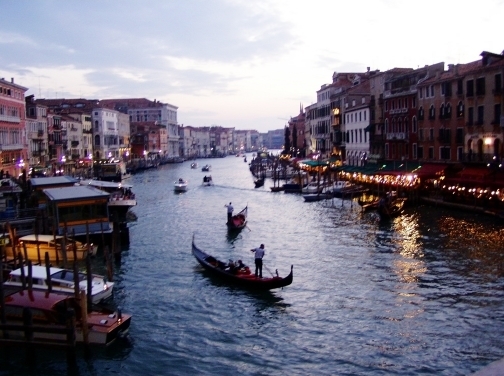Italian for Beginners
 Thursday, June 10, 2010 at 00:45
Thursday, June 10, 2010 at 00:45 In Denmark in the early nineties a man named after a German city had the audacity (born, we are told, from a severe religious crisis) to return modern cinema to a charming form of dalliance. Gone were the lavish sets, thunderclap soundtracks and disruptions in that sticky matrix we call the time and space continuum; in their stead came onsite filming, diegetic music, and a sharp focus on the ineluctable modality of the visible with the help of a handheld camera. Von Trier, a man of devout belief in the future of cinema and his soul, has tinkered with his pretentious manifesto in enough ways as to elicit the envy and derision of far less talented filmmakers and critics, which, of course, only augments his Jupiter-sized ambition. Yet what is most interesting about the Dogme 95 declaration is that it emanated from a small country. Denmark has fewer than six million inhabitants, but in the last thirteen years it has probably produced thirty first-rate films as well as many others that are sufficiently watchable (the crown jewel of all these titles having been reviewed elsewhere on these pages). Being a laid-back, attractive, fun-loving nation, if reticent at times, Danes are naturally equipped to handle the rigors of spontaneous acting because hysterics, wild gesturing, and insane monologues simply do not do. Life and society, however informal Danes tend to be, are constructs that have propelled them to the forefront of European style and urban culture; that they should venture into cinema to record this modern expansion is therefore hardly a surprise. Yet there is almost nothing modern or progressive about this pleasing take on an old-fashioned comedy of manners.
 The manners involved are those of a small village's batch of eccentrics who range from a widowed and tattooed pastor (Anders W. Berthelsen) to a foul-tempered restaurateur (Lars Kaalund) to a hopelessly clumsy shop assistant (Anette Støvelbæk). Their sextet is rounded out by an awkward middle-aged hotel employee (Peter Gantzler) who has been, ahem, without love for an extremely long time, a hairdresser (Ann Eleanora Jørgensen), and the Italian in the lot, a young woman called Giulia. They are all, for one reason or another, single. Andreas the pastor soothes his grief by driving a Ferrari; Finn takes out his frustrations on the few people who dine at his small establishment, where his service staff includes Giulia; Olympia is so incompetent she can barely hold a job and has to care for an old vulgarian of a father who seems to hate her; Karen cuts hair every now and again, but mostly spends her time seeing to her sick mother; and love-deprived Jørgen keeps making eyes at Giulia although they are, shall we say, linguistically incompatible. By all indications Danish villages are very bizarre places. So when an Italian class taught at the local community center unites the characters (except, of course, Giulia), we sense destiny weaving its loom around all involved, which should bring them happiness or at least a new lease on their tired lives. There might even be a chance of a field trip to that southern land! Romance shall blossom like jasmine on a young woman's clavicle! All will be redeemed and the sun shall rise anew on this little Danish village we have come to like so much.
The manners involved are those of a small village's batch of eccentrics who range from a widowed and tattooed pastor (Anders W. Berthelsen) to a foul-tempered restaurateur (Lars Kaalund) to a hopelessly clumsy shop assistant (Anette Støvelbæk). Their sextet is rounded out by an awkward middle-aged hotel employee (Peter Gantzler) who has been, ahem, without love for an extremely long time, a hairdresser (Ann Eleanora Jørgensen), and the Italian in the lot, a young woman called Giulia. They are all, for one reason or another, single. Andreas the pastor soothes his grief by driving a Ferrari; Finn takes out his frustrations on the few people who dine at his small establishment, where his service staff includes Giulia; Olympia is so incompetent she can barely hold a job and has to care for an old vulgarian of a father who seems to hate her; Karen cuts hair every now and again, but mostly spends her time seeing to her sick mother; and love-deprived Jørgen keeps making eyes at Giulia although they are, shall we say, linguistically incompatible. By all indications Danish villages are very bizarre places. So when an Italian class taught at the local community center unites the characters (except, of course, Giulia), we sense destiny weaving its loom around all involved, which should bring them happiness or at least a new lease on their tired lives. There might even be a chance of a field trip to that southern land! Romance shall blossom like jasmine on a young woman's clavicle! All will be redeemed and the sun shall rise anew on this little Danish village we have come to like so much.
Well, not exactly. In the middle of the first class attended by Olympia, one of the earth's most cursed mammals, the portly, middle-aged (but very suave) instructor gets a little light-headed then promptly drops dead. Since this is a canonical Dogme film, no signs of death are actually allowed (that is to say, an actor may fall down and we may assume him to be dead, but a close-up of him not breathing or any fake blood is prohibited). Their sole respite from the daily tedium now gone, the masses revert to their semi-suicidal state until one student decides to take matters into his own hands and teach the class himself. His Italian for a non-native is quite good (everyone, it seems, has a secret talent or two) and this makes the dream of Italy much more tangible to his classmates. My policy of nondisclosure precludes any more details, but I will add that certain things that are expected to happen do indeed take place, with twists that are hardly contrived. The magic of Dogme is precisely its proximity to our real existence untempered by the manipulative imagery and tones that are supposed to direct our thoughts. Conflicted emotions, half-gnawed assent, and hesitancy are all perfectly acceptable because that is how we feel most of the time about most of the world. You may be pleased with the Danes and their cosmopolitan approach to escape or you may say that this sort of stuff only happens to other people. Or maybe you'll simply forget you're watching a film about strangers, which is exactly what these sweet if misled people might have hoped had they been showing you, for example, one of their prized home videos.






